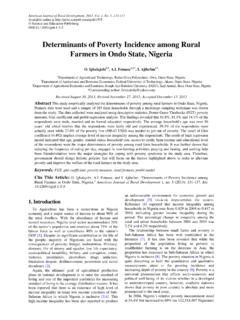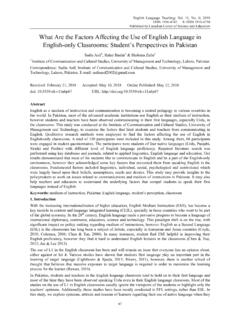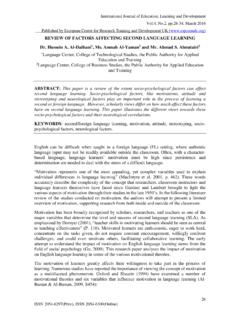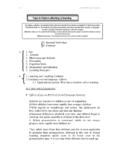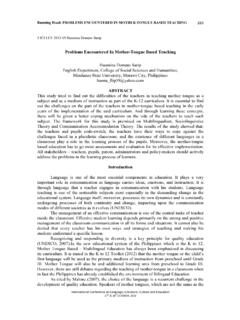Transcription of Relationship between Parental Involvement and Academic ...
1 American Journal of Educational Research, 2018, Vol. 6, No. 1, 1-8 Available online at Science and Education Publishing -1 Relationship between Parental Involvement and Academic performance of Senior High School Students: The Case of Ashanti Mampong Municipality of Ghana Mark Owusu Amponsah1,*, Eugene Yaw Milledzi1, Eric Twum Ampofo2, Martin Gyambrah3 1 Department of Education and Psychology, College of Education Studies, University of Cape Coast, Ghana 2 Department of Educational Psychology, College of Education, Ashanti Mampong, Ghana 3 Department of Business Psychology, University of Applied Management, Accra, Ghana *Corresponding author: Abstract The study explored the Relationship between Parental Involvement in education and Academic performance of senior high school students in the Ashanti Mampong Municipality of Ghana.
2 The descriptive correlational research design was used to conduct the study. Stratified random sampling procedure was employed to select a total sample of 471 respondents made up of 186 males and 285 females. Questionnaire and test items on Mathematics and english language were the research instruments used to collect data for the study. Data analysis was conducted by employing descriptive statistical tools (mean and standard deviation scores) to examine students perceived Parental Academic ambition and Involvement in their education while the Zero-order correlation was used to examine the relationships between Parental Involvement in education and Academic performance . The results of the study show a significant positive Relationship between Parental Involvement in education and students Academic performance . It is recommended from the study that parents should play a leading role in supporting their children s education since they are the first to expose children to the social and Academic world.
3 Keywords: Parental Involvement , Academic ambition, Academic performance , Education Cite This Article: Mark Owusu Amponsah, Eugene Yaw Milledzi, Eric Twum Ampofo, and Martin Gyambrah, Relationship between Parental Involvement and Academic performance of Senior High School Students: The Case of Ashanti Mampong Municipality of Ghana. American Journal of Educational Research, vol. 6, no. 1 (2018): 1-8. doi: 1. Introduction A person s education is closely linked with his or her life chances, income and general well-being. Therefore, the success of students in any Academic task has become a major concern to educators, parents, researchers and society. Literature indicates that there is lack of specific or universal definition of Academic performance . This is because Academic performance is a multidimensional construct composed of the skills, attitudes, and behaviours of a learner that contribute to Academic success in the classroom [1].
4 To other researchers, Academic performance is determined by examination grades at the end of a particular term, semester or programme [2]. Higher scores indicate better Academic performance . It is a satisfactory and superior level of performance of students as they progress through and complete their school experience. The implication of this definition is underscored by studies which repeatedly demonstrate that the vast majority of students who withdraw from school do so for no reason other than poor Academic performance . Measuring Academic performance can occur at multiple levels and serves multiple purposes. For instance, it has been indicated that classroom teachers often conduct formative and summative tests to evaluate student mastery of course content and provide grades for students and parents [3].
5 Graduation tests in particular are used to determine whether a student has mastered the minimum content and competencies required to receive a high level of education. Each of these kinds of assessments engenders significant questions related to test design, types of decisions supported by the results as well as alternative assessment [3,4]. A number of studies have been conducted to explore the factors that affect Academic performance of students in a number of educational institutions. Majority of these studies have focused on parents (family causal factors ), teachers ( Academic causal factors ), and students (personal causal factors ) [5,6,7]. Even though a combination of these factors influence Academic performance of students, they vary from one Academic environment to another, from one set of students to the next, and from one cultural setting to another [5].
6 Individual characteristics such as previous school achievements, Academic self-efficacy or study motivation have been identified to correlate with Academic performance [8]. Also, socio-economic background with specific reference to parents education has been shown to have a positive influence on the Academic performance of students [9,10,11]. 2 American Journal of Educational Research 2. Parental Ambition and Academic performance Parental ambition is what parents hope and want their children to achieve in future. Parents Academic ambitions for their children might influence their children s Academic achievements both directly and indirectly [12]. Parents Academic ambition for their children has been identified to have a telling effect on the children s Academic performance [13].
7 The expectancy value theory argues that people judge the instrumentality of possible options, weigh their costs and benefits, and then select the course of action with the highest expected value. Parental expectations, therefore, are wishes about their children s Academic achievement and career ambition. Many parents believe that transmitting a sense of high Academic ambitions to their children is one way to infuse them with the confidence, self-esteem, and personal standards of merit and value [14]. Empirical studies have reported significant relationships between Parental ambitions and psychological adjustment, psychological distress and Academic achievement of children [15,16]. Other researchers in their studies have established a significant effect of Parental ambition on Academic success of their children [17,18].
8 It should be noted that Parental ambition is one of the extra-curricular factors that might influence children's Academic performance . It has been pointed out that parents who have high ambitions for their children to do well in Academic matters have children who show most rapid cognitive progress [19]. A similar study found that parents Academic ambition for their children partially mediated the relationships between assets and children s educational achievements showing the significant effect of Parental ambitions on education of their children after controlling for family income and other parent characteristics [20]. Although Parental ambition is considered as one of the cultural factors affecting Academic performance of students, some researchers [18,21] in their studies have reported negative effects such as adjustment problems, psychological distress as well as behaviour problems.
9 They reported that college students experience low level of self-worth and adjustment when higher expectation discrepancies are present between themselves and their parents. Their studies further revealed that parents Academic ambition for their children is one of the basic sources of Academic stress in middle and high school students. In contrast, a study in Canada found that Parental Academic ambition for their children was positively associated with 19 percent of the variance in Academic performance [19]. It was argued that Parental beliefs influence their children's perceptions of their own abilities, their attitudes, and expectations for Academic success and this directly affects the children's cognitive performance [22]. A study on the effects of perceived Parental ambitions on the mathematics performance of children established that while taking arithmetic test anticipating Parental evaluation and expectation, the performance was better for those who perceived their parents as having higher ambitions for them [23].
10 Studies continue to give credence to the fact that parents achievement beliefs, attitudes and values not only guide their behaviour with their children [24], but also appear to have an influence on their children's Academic achievement beliefs. For example, it has been indicated that among a group of uniformly high achieving children, perceptions of Academic competence were influenced more by parents' ambitions than by the children's record of Academic achievement [25]. Similarly, a study found that students Academic expectations have a strong positive association with perceived Parental Academic ambition particularly with regard to maternal educational goals [26]. 3. Parental Involvement and Academic performance Parental Involvement has been defined in various ways by various authors in the literature.

